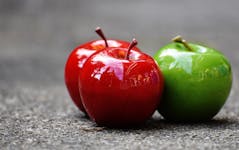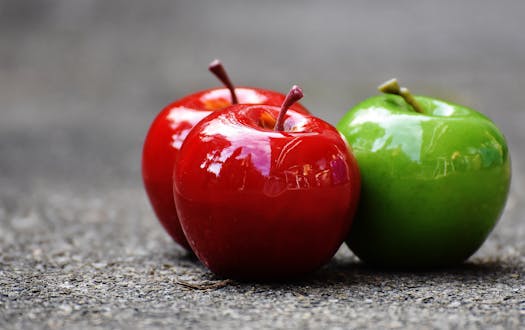Does an Apple a Day Keep the Doctor Away? Myth Busted

Does an Apple a Day Keep the Doctor Away? Myth Busted
You’ve probably heard the saying, “An apple a day keeps the doctor away,” tossed around as a golden rule for health. This apple a day keeps doctor away myth suggests that eating one apple daily can prevent all illnesses, keeping you doctor-free. But is this catchy phrase backed by science, or is it just a folksy exaggeration? Join us at omnimyths.com to dig into the truth and discover how apples fit into a healthy life!
The Roots of the Apple-a-Day Myth
Where did the apple a day keeps doctor away myth come from? It’s a proverb with deep historical roots. The phrase first appeared in a 19th-century Welsh proverb, “Eat an apple on going to bed, and you’ll keep the doctor from earning his bread,” recorded in 1866 (Folklore, 2021). By the early 20th century, it morphed into the modern version in the U.S. and U.K., popularized by health campaigns promoting apples as a nutritious snack (University of Illinois, 2022). Apples were cheap, abundant, and tied to wholesome rural life, making them a perfect symbol for health. From London to Lagos, the saying spread, embedding itself in global health folklore (The Conversation, 2024).
Why did it stick? Apples were seen as nature’s candy, and the rhyme’s simplicity made it memorable, even if it oversold their powers.
Why We Love the Apple-a-Day Myth
The apple a day keeps doctor away myth endures because it’s simple and hopeful. Who doesn’t want an easy health fix?
Imagine Priya, a teacher in Mumbai, munching an apple daily, believing it wards off colds. Her habit mirrors millions worldwide, from New York to Nairobi, where apples are a go-to snack for health-conscious folks. The myth’s appeal lies in its promise of effortless wellness, reinforced by parents and teachers passing it down (American Psychological Association, 2023). It feels like a small, doable step to a healthier life.
Social media keeps the myth alive. X posts and TikTok videos praise apples as “superfoods,” with influencers showing off shiny red snacks as health hacks. The apple health benefits hype makes the proverb feel like timeless wisdom, even if it’s not entirely true (Forbes, 2025).
Debunking the Apple-a-Day Myth
Let’s break down the apple a day keeps doctor away myth with science to see what apples can—and can’t—do for your health.
Apples Are Nutritious, Not Magical
Apples are packed with apple health benefits like fiber (4g per medium apple), vitamin C (14% of daily needs), and antioxidants, which support digestion and immunity (USDA, 2023). However, no single food prevents all illnesses. Studies show a balanced diet, not just apples, reduces doctor visits by supporting overall health (Harvard T.H. Chan School of Public Health, 2023). The myth exaggerates apples’ power.
No Evidence for Doctor-Free Claims
No research proves eating an apple daily eliminates medical needs. A 2015 study found apple eaters had slightly fewer doctor visits, but only when paired with a healthy lifestyle, not as a standalone cure (JAMA Internal Medicine, 2015). The diet myths around apples ignore the need for variety—vegetables, proteins, and whole grains matter too. Apples alone won’t keep the doctor away.

Sugar and Dental Health
Apples contain natural sugars (about 19g per fruit), which can contribute to tooth decay if eaten without oral hygiene. Dentists warn that frequent snacking, even on apples, requires brushing to prevent cavities (American Dental Association, 2023). The healthy eating facts show apples are good but not a free pass for dental care.
Lifestyle Matters More
Health depends on exercise, sleep, and stress management, not just one fruit. A 2024 study linked comprehensive diets to a 30% lower risk of chronic diseases, far beyond what apples alone achieve (National Institutes of Health, 2024). The apple a day keeps doctor away myth oversimplifies wellness, ignoring broader habits.
The Real Impact of Believing the Myth
Picture Ahmed, a student in Cairo, eating an apple daily, thinking it’s enough to stay healthy. When he catches a cold, he’s confused, having skipped veggies or exercise, misled by the apple health benefits hype. This story plays out globally, from Brazil to Japan, where people over-rely on apples instead of balanced diets (The Conversation, 2024). The myth can lead to disappointment or neglect of other health needs.
The proverb also overshadows dietary diversity. In Nigeria, where fruits like mangoes are abundant, focusing solely on apples limits nutritional variety. X posts hyping apples as cure-alls can mislead, distracting from holistic healthy eating facts (Healthline, 2025).
How to Make Apples Part of a Healthy Life
Incorporate Apples Smartly
- Pair with variety: Eat apples with nuts or yogurt for balanced nutrients.
- Choose whole apples: Avoid sugary apple juice, which lacks fiber.
- Wash thoroughly: Remove pesticides to maximize apple health benefits (USDA, 2023).
Build a Balanced Diet
- Mix food groups: Include leafy greens, lean proteins, and whole grains daily.
- Limit processed foods: Cut back on sugary snacks for better health.
- Consult a dietitian: Get personalized plans for optimal nutrition (Mayo Clinic, 2024).
Support Overall Wellness
- Exercise regularly: Aim for 30 minutes of activity most days.
- Brush after eating: Protect teeth from apple sugars with good hygiene.
These tips ensure apples shine without the apple a day keeps doctor away myth (National Institutes of Health, 2024).
Real-Life Wins from Balanced Diets
Take Maria, a nurse in Chicago, who added apples to a diet rich in veggies and exercise, feeling more energized and visiting the doctor less. Or consider Ravi, a farmer in India, who pairs apples with local fruits like guava, boosting his immunity without relying on one food. These stories show that healthy eating facts trump the apple a day keeps doctor away myth when you embrace variety (Forbes, 2025).
Conclusion
The apple a day keeps doctor away myth is a charming proverb, but apples alone can’t prevent all illnesses—health requires a balanced diet and lifestyle. While apples offer great apple health benefits, they’re not a magic cure. Eat smart, live well, and skip the doctor when you can! Explore more diet myths at omnimyths.com!
Frequently Asked Questions
Q: Does an apple a day really keep the doctor away?
A: The apple a day keeps doctor away myth exaggerates—apples are nutritious with fiber and vitamins but can’t prevent all illnesses. A balanced diet and lifestyle are key to health. Studies show apples reduce doctor visits slightly when part of a varied diet. They’re healthy, not magical (Harvard T.H. Chan School of Public Health, 2023).
Q: What are the health benefits of apples?
A: Apples offer apple health benefits like 4g of fiber, 14% of daily vitamin C, and antioxidants, aiding digestion and immunity. They’re low-calorie and heart-healthy but work best in a diverse diet. Alone, they can’t replace other nutrients. Pair them with veggies and proteins for balance (USDA, 2023).
Q: Why is the apple-a-day myth so popular?
A: The apple a day keeps doctor away myth is catchy, simple, and tied to apples’ wholesome image. Its 19th-century roots and health campaign push made it global. X posts and influencers hype apples as superfoods, fueling diet myths. It’s hopeful but oversimplified (Folklore, 2021).
Q: Can apples harm my health in any way?
A: Apples’ natural sugars (19g per fruit) can contribute to cavities if you skip brushing. Pesticides on unwashed apples may pose risks. Eating only apples neglects other nutrients, debunking healthy eating facts. Moderation and hygiene keep apples safe (American Dental Association, 2023).
Q: How can I include apples in a healthy diet?
A: Eat whole apples as snacks, pair with nuts or yogurt, and wash them well to maximize apple health benefits. Combine with diverse foods like greens and proteins. Use whitening sunscreen cream if eating outdoors to protect skin. A balanced approach beats the myth (Mayo Clinic, 2024).
Q: Is the apple-a-day saying completely false?
A: The apple a day keeps doctor away myth isn’t entirely false—apples are healthy but don’t prevent all doctor visits. They support wellness as part of a varied diet, not a cure-all. Lifestyle factors like exercise matter more. The proverb’s charm outstrips its science (National Institutes of Health, 2024).
